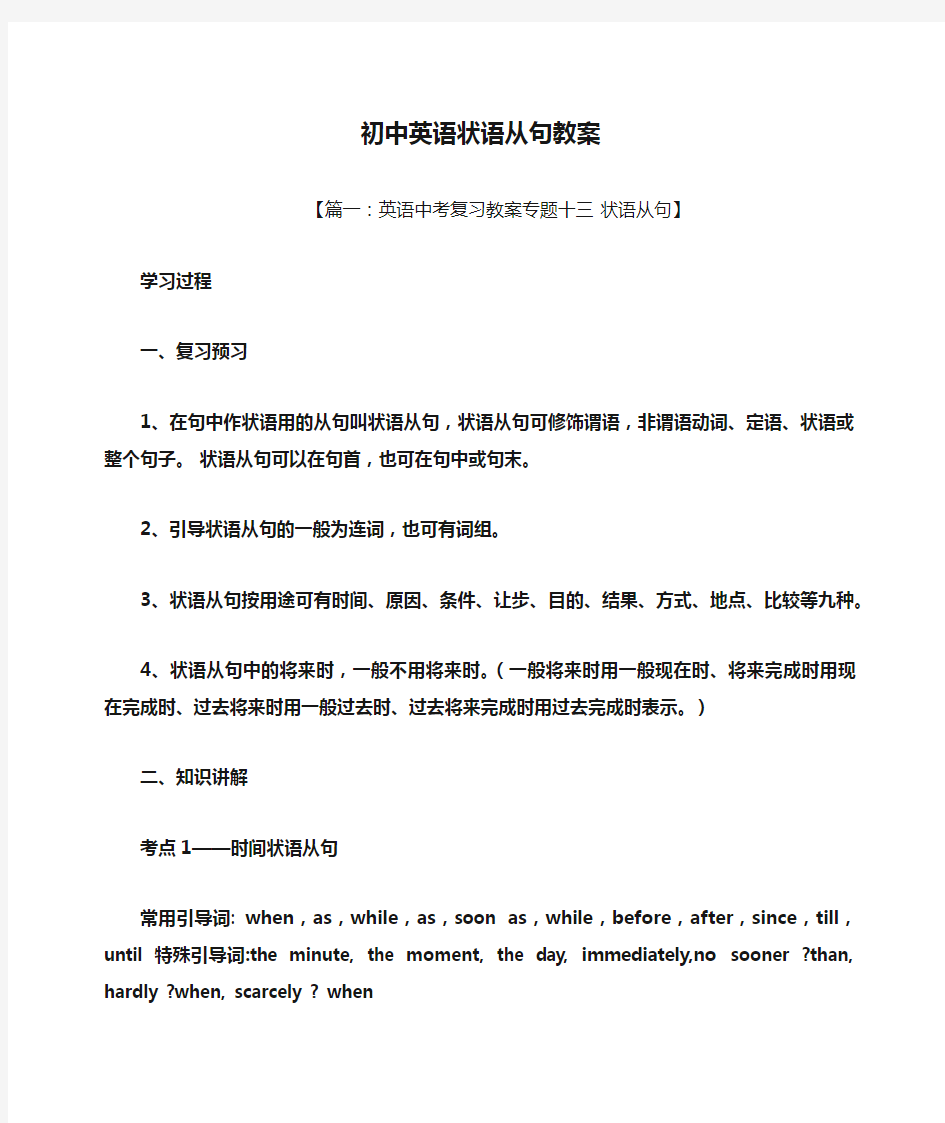初中英语状语从句教案

- 1、下载文档前请自行甄别文档内容的完整性,平台不提供额外的编辑、内容补充、找答案等附加服务。
- 2、"仅部分预览"的文档,不可在线预览部分如存在完整性等问题,可反馈申请退款(可完整预览的文档不适用该条件!)。
- 3、如文档侵犯您的权益,请联系客服反馈,我们会尽快为您处理(人工客服工作时间:9:00-18:30)。
初中英语状语从句教案
【篇一:英语中考复习教案专题十三状语从句】
学习过程
一、复习预习
1、在句中作状语用的从句叫状语从句,状语从句可修饰谓语,非谓语动词、定语、状语或整个句子。状语从句可以在句首,也可在句中或句末。
2、引导状语从句的一般为连词,也可有词组。
3、状语从句按用途可有时间、原因、条件、让步、目的、结果、方式、地点、比较等九种。
4、状语从句中的将来时,一般不用将来时。(一般将来时用一般现在时、将来完成时用现在完成时、过去将来时用一般过去时、过去
将来完成时用过去完成时表示。)
二、知识讲解
考点1——时间状语从句
常用引导词: when,as,while,as,soon as,while,before,after,since,till,until 特殊引导词:the minute, the moment, the day, immediately,no sooner ?than, hardly ?when, scarcely ? when
1) when, while, as的区别:
①三者均可表示“当??的时候”, 如果主句表示的是短暂的动作, 而从句表示的是一段时间, 三者可通用。
② as和when都可与终止性动词连用, while 只能与延续性动词连用。如:
it was snowing ____ we got to the airport.当我们到达机场时, 天正下着雪。(不能用 while)
③as强调主句与从句表示的动作同时发生; while强调主句表示的动作持续于while所指的整个时间内; when可指主、从句所述动作同时或先后发生。如:
he sang as he went along. 他边走边唱.
please write____ i read. 我读的时候, 请写下来。
____ he reached home, he had a little rest. 回到家后, 他休息了一会儿。
whenever we met with difficulties, they came to help us.
i got in touch with him immediately i received his letter.
my sister came directly she got my message.
every time i catch a cold, i have pain in my back.
如果把no sooner, hardly, scarcely, barely置于句首,它所连带的这部分要倒装,如: no sooner had she heard the news than she fainted.
(she had no sooner heard the news than she fainted.)
考点2——条件状语从句
常用引导词: if,unless,(if not)
特殊引导词:as/so long as,on condition that
① we’ll start our project ___ the president agrees.
② you will certainly succeed ____ ___ ___ you keep on trying.要点: 引导条件状语从句的连词有if(如果)、unless(除非)等, unless 在意义上相当于if?.not。条件状语从句也像时间状语从句一样,如果主句用将来时, 从句要用现在时代替将来时。如:
you will fail ____ you study hard.
(=you will fail if you dont study hard.)除非你努力学习, 否则你会失败。注意:有时可以把祈使句作为条件从句,祈使句后面要搭配and,如:
come tomorrow, and i will tell you./persevere and you will succeed.
give him an inch and he’ll take a mile. (= if you give him an inch, he’ll take a mile. )
但:当表示否定的条件时,可用连词or 或otherwise,如:
make up your mind, or you’ll miss the chance.
start at once, or / otherwise you’ll miss the train.
(= if you don’t start at once, ?)
(= unless you start at once, you’ll miss the train.)
考点3——原因状语从句
(1)常用引导词: because, since, as , now that
(2)because, since, as, for 用法比较:
一).because: 语气最强,回答why引导的疑问句,该从句一般位于主句后,所表示的是直接理由,因果关系不能同so连用。
why are you late?because there is a traffic jam.
—why cant i go? 为什么我不能去?
— ____ youre too young. 因为你年纪太小了。
二).since: “既然?..” 表对方已知的事实或理由,从句常放在句首。since比as正式。since you have got enough money with you now, you can come and buy it next time.
三). as: “由于?.” 语气较弱较口语化,表明显的原因或已知的事实,从句常放在句首。as he had been ready for the worst, he was
not disappointed at the result. ____you are not feeling well,youd better stay at home.
既然你不太舒服,还是留在家里的好
四).for是一个等立连词,连接的是两个并列的分句,其他三个引
导的是状语从句;for不能放在句首。
it must have rained last night, for the ground is wet.
考点4——目的状语从句
常用引导词:so that,in order that
引导目的状语从句时,从句中常有can, could, may, might, would
① the boss asked the secretary to hurry up with the letters
__________ he could sign them.
② the teacher raised his voice _______________ the students
in the back could hear more clearly.
考点5——结果状语从句
常用引导词: so?that,such?that
1. so?that和such?that引导的结果状语从句,意为“如此..以至于”,用来补充说明主句动作发生所带来的结果
the boy is so young that he cannot go to school
it is such nice weather that i would like to go to the beach
2.so?that中so是副词,用来修饰形容词或副词:so + 形容词/副
词/分词 + that引导结果状语从句
he studied so hard that he made great progress
such?that中 such是限定词,只能修饰名词和名词词组,such + (形容词) + 名词 + that引导结果状语从句
mike is such an honest man that we all believe
3.(1)主+谓+so+adj./adv+that 从句.
(2)主+谓+so+adj+a(n)+单数名词+that从句 .
主+谓+such+a(n)+adj.+单数名词+that从句 .
it’s such a fine day that we all want to go outing.
= it’s so fine a day that we all want to go outing.
(3)主+谓+so+many/much/few/little(少)+名词+that从句 eg.
